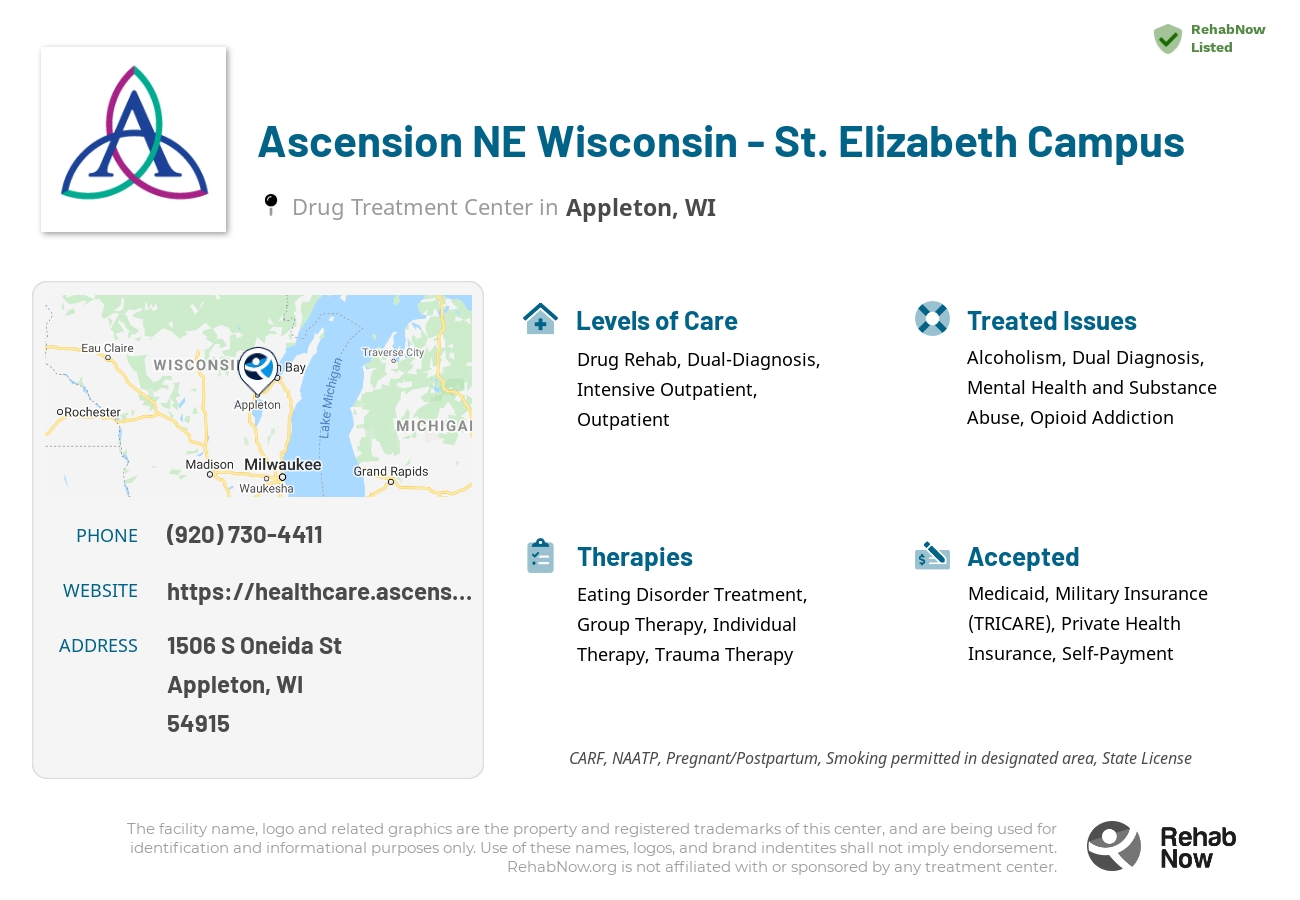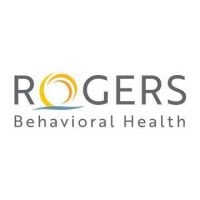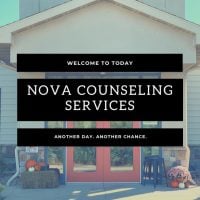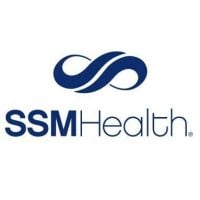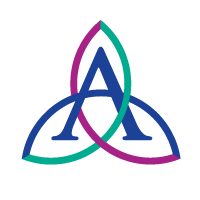
Ascension NE Wisconsin - St. Elizabeth Campus
Drug Rehab Center in Appleton, Wisconsin
- Opioid Addiction
- Eating Disorder
- Dual Diagnosis
- Drug Addiction
- Alcoholism
The St. Elizabeth Campus of Ascension NE Wisconsin offers a comprehensive range of addiction treatment services, including drug rehab, dual-diagnosis, intensive outpatient, and outpatient care, with the highly trained staff dedicated to providing the best possible care and support to those in Appleton, Wisconsin with private health insurance coverage.
About Ascension NE Wisconsin - St. Elizabeth Campus in Wisconsin
Ascension NE Wisconsin - St. Elizabeth Campus in Appleton, Wisconsin offers comprehensive care for individuals suffering from substance abuse and addiction. They provides a continuum of care for individuals at all stages of their recovery from drug rehab, dual-diagnosis, intensive outpatient, and outpatient levels of care. The facility accepts private insurance and is affiliated with Ascension Wisconsin. Moreover, the facility offers treatment for specific addictions such as alcohol, opioids, dual diagnosis, eating disorders, and other drug addictions.
At Ascension NE Wisconsin - St. Elizabeth Campus, they are committed to providing quality care for those who are struggling with addiction. Through individualized treatment and comprehensive services, their experienced multidisciplinary team helps those in their care regain control of their lives. All of their programs are accredited by the Joint Commission and are fully licensed by the State of Wisconsin. Additionally, they utilize evidence-based practices and therapies to ensure that their clients receive the most effective care possible.
Genders
Ages
Modality
Additional
Conditions and Issues Treated
Opioid addiction starts when a person becomes addicted to legal or illegal opioids. The addiction can happen quickly, in just a matter of days. Opioid withdrawal can be extremely uncomfortable and lead the user to continue to use even if they want to quit. Stopping using an opioid requires medical observation. Sometimes inpatient treatment with a medically supervised detox is necessary for managing the withdrawal process while learning lasting tools for maintaining recovery. Medications may be used in some cases of opioid addiction.
Opioid addiction is one of Wisconsin‘s most prominent forms of addiction. It’s treated by detoxifying the body so that the chemicals from the medications no longer impact them and by therapies to correct behavior and target the root of the problem.
Recovery is not simply about stopping drug use. Recovery is working with addiction while recovering mental health issues that are fueling the addiction in the first place.
Levels of Care Offered
This center offers a variety of custom treatment tailored to individual recovery. Currently available are Drug Rehab, Dual-Diagnosis, Intensive Outpatient, Outpatient, with additional therapies available as listed below.
Addicts who need help with their addiction can enroll in an intensive outpatient program (IOP). But the patient won’t live there during treatment.
IOP involves patients visiting a medical office building regularly for therapy and other services while continuing to live their lives.
IOP is a step up from drug or alcohol detox, but it’s still a phase of recovery, not the end goal. Patients in need of IOP have many options for rehab and treatment.
Outpatient treatment is considered the lower intensity level of addiction treatment. It’s ideal for early phase addiction or lower intensity addictions. It may include weekly sessions instead of daily. It may include weekly sessions instead of daily. Peer group support, 12-step programs, and individual counseling may still be involved but at a lesser frequency than an intensive outpatient program. It is a good choice for someone who doesn’t need to go through a medically supervised detox and who has a supportive home environment. It requires motivation and dedication to commit to the program without constant monitoring.
Therapies & Programs
Individual therapy involves one-on-one sessions between the patient and therapist. It provides patients with a safe environment to openly discuss personal and sensitive issues with the therapist. They find the therapist as someone they can trust. Individual therapy aims to identify the core issues that would have led the patient to substance abuse and address them effectively. The therapist can develop patient-specific customized solutions through individual therapy, which aids speedier recovery.
Groups typically involve meetings with other recovering addicts who can relate to one another’s experiences. They might meet in person or online and typically focus on the process of staying sober rather than overcoming a specific addiction.
In these groups managed by Ascension NE Wisconsin - St. Elizabeth Campus, addicts can build a sense of community and develop strong emotional connections with others who understand what they are going through. These beneficial relationships can help addicts overcome their cravings and prevent relapse at any point during the recovery process.
In general, trauma therapy is a clinical process that helps individuals deal with mental stress often caused by traumatic events. The therapist helps the person identify, understand, and work through the problem. This is done with the help of talking about it in group or one-on-one counseling sessions. Therapists use relaxation, role-playing, art, and music to help the person open up about what is bothering them.
There are many different types of trauma therapists, such as psychiatric nurses and counselors. Not everyone is a good candidate for this type of therapy; it is generally reserved for people who have recently experienced a traumatic event and struggle to get over it. It is often done for children, teenage victims of sexual assault, and war veterans.
Payment Options Accepted
For specific insurance or payment methods please contact us.
Is your insurance accepted?
Ask an expert, call (888) 674-0062
Ascension – Wisconsin Associated Centers
Discover treatment facilities under the same provider.
- Columbia St. Mary's Hospital - Ozaukee in Mequon, WI
- Ascension St. Francis Hospital - Outpatient Center - Behavioral Health in Milwaukee, WI
- Ascension St. Francis Hospital - Outpatient Center - Behavioral Health in Milwaukee, WI
- Ascension - St. Michael's Hospital in Stevens Point, WI
- Ascension All Saints Hospital - Spring Street Campus in Racine, WI
Learn More About Ascension – Wisconsin Centers
Additional Details
Specifics, location, and helpful extra information.
Appleton, Wisconsin 54915 Phone Number(920) 730-4411 Meta DetailsUpdated November 25, 2023
Staff Verified
Ascension NE Wisconsin - St. Elizabeth Campus Patient Reviews
There are no reviews yet. Be the first one to write one.
Appleton, Wisconsin Addiction Information
Wisconsin has some of the highest rates in the United States for both adolescent and adult substance abuse. Since 2009, the state has been experiencing the same escalating rates of drug abuse and addiction as the rest of the country. The major concerns are the misuse of prescription painkillers and the escalating number of deaths due to alcohol-related liver disease.
In 2018, there were 1,752 drug abuse cases in Appleton, Wisconsin. The most common type of drug abuse in the city is heroin. Drug dealers have been known to target young people in the community. In 2013, there were 812 drug-related hospitalizations in Appleton, WI. If you are looking for a comprehensive drug rehab program in Appleton, WI, your family, friends, or health professionals can help you with finding one.
Treatment in Nearby Cities
- New Richmond, WI (212.1 mi.)
- Waterford, WI (103.2 mi.)
- Frederic, WI (221.5 mi.)
- New Berlin, WI (89.2 mi.)
- Hayward, WI (193.7 mi.)
Centers near Ascension NE Wisconsin - St. Elizabeth Campus
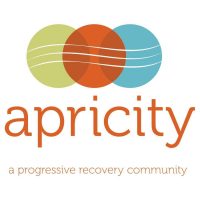

The facility name, logo and brand are the property and registered trademarks of Ascension NE Wisconsin - St. Elizabeth Campus, and are being used for identification and informational purposes only. Use of these names, logos and brands shall not imply endorsement. RehabNow.org is not affiliated with or sponsored by Ascension NE Wisconsin - St. Elizabeth Campus.

